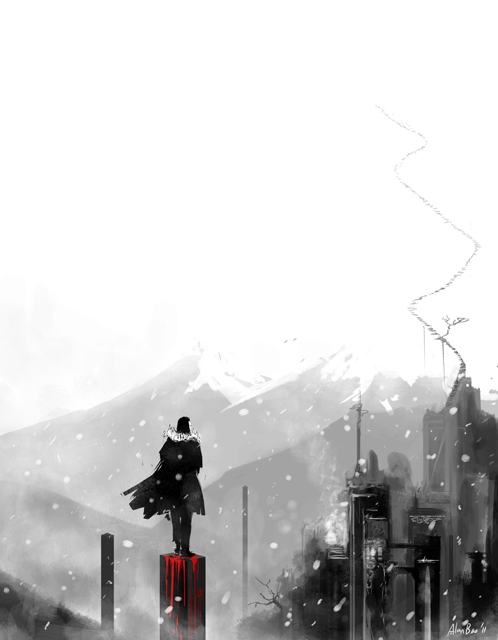
art by Alan Bao
Autopsy
by Budge Burgess
I am kept abreast of the very latest scientific knowledge. I know the human body and its every function. Male or female, young, old, I can model the ideal form and relate it to any example, from grossly obese to morbidly anorexic, short or long, whatever shape and shade of human being.
I can identify each biochemical or physical activity, dissect organs, analyze stomach contents and lung capacity, isolate toxins, evaluate liver and kidney health, spot disease, trauma or injuries of any kind. Give me a body, I'll tell you how it died, when, and often where. If I can't write a full cradle-to-grave biography, I can produce a cogent description of how it lived its life. Give me a body, I'll give you answers.
I learn. Five years, working 24/7. I don't sleep, don't take lunch breaks, don't stop for Christmas. I perform an autopsy, clean and disinfect myself, perform another. They bring me bodies from all over the country. Hour after hour, day after day, I seek cause of death. Day after day, I learn.
I can uncover, with absolute certainty, how a person died. What I can't explain is why people find so many ways to kill themselves. And others. I tackle the detritus of car crashes, violence, sudden accident, the creeping tragedy of drugs, alcohol, tobacco or diet. And I wonder why they do it.
Surgeons and doctors, coroners and police officers, scientists, press, and the curious stream by to marvel at my skills. They study my four arms with their multitude of appliances, my lasers and dissecting tools, my analytical functions. They gasp at the delicacy and precision of my brain or heart exploration.
I hear them preen and pride themselves--"Yes, it was my research which led to
" or "it was my idea to
" or "I designed
" and they'll mention my speech recognition software, my microscopic vision, my surgical skills, my every wonder.
They ask me questions, they consume my written reports and analyses, they use my findings to stand in court and explain how this body died. No one ever talks to me.
Except Eileen. She always asks if I've had a busy day, is there anything I need. I've taught her the art of conversation and she passes on the gossip she overhears on her rounds. Eileen comes whenever I call her, cleans and tidies after each autopsy, then purrs off to dispose of the detritus.
I remain in the middle of the room, a production line disassembling bodies. I undress them, examine them, treat them respectfully and tenderly, establish cause of death, preserve forensic evidence for police and lawyers.
I work. I wait. Nobody explains to me what life is, they merely enquire how death happened. I see the dead, I do not see the dying. I do not witness death. I understand how it happens, much of the time I cannot fathom why.
I caused Eileen a lot of trouble tonight. She took an extra hour cleaning after me. Never complained.
I used a precision scalpel strike. The blood spray from the professor's left carotid artery was exactly as I pictured it. I was accurate to the second in predicting time to unconsciousness, given my assessment of his body mass, age, and fitness. Death was precisely on time.



